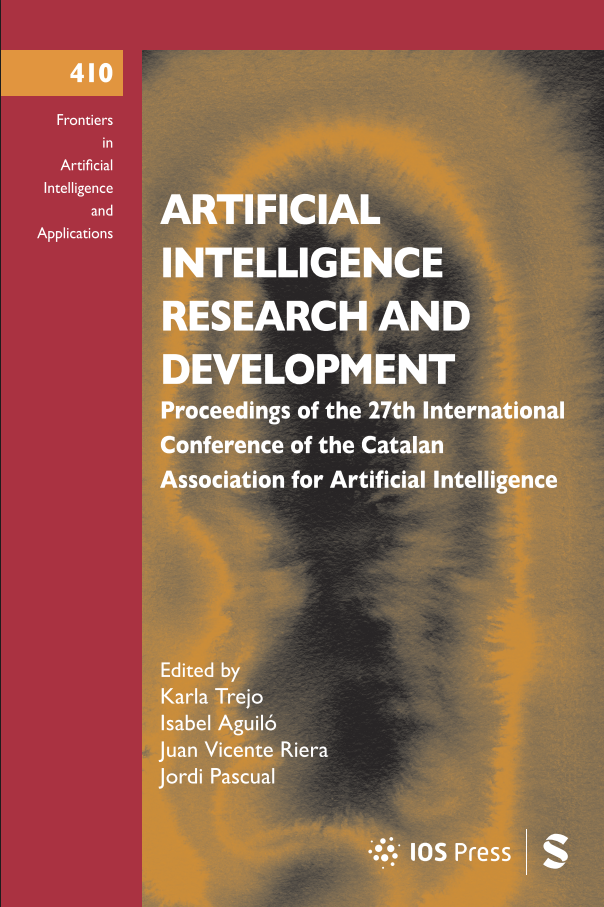We invite you to participate in the 27th International Congress of the Catalan Association for Artificial Intelligence (CCIA 2025) which will take place on October 15th, 16th, and 17th of 2025 at the Felix Hotel Valls.
April 9
Deadline for submitting the abstract and keywords
May 6
Deadline for article submissions
June 15
Deadline for communication of acceptance of articles
July 5
Deadline for early congress registration
July 5
Deadline for the final submission version
October 15, 16, 17
Congress dates
We invite you to submit papers that reflect both finished and works in progress work, with original and promising ideas. The following types of submissions are accepted:
Long papers will be peer-reviewed based on their technical quality, relevance to the conference topics, originality, relevance, significance, and clarity. Short papers will be evaluated for their significance as descriptions of work in progress. Abstracts must reflect initial and/or disruptive ideas that generate discussion. Please note that all submissions must be original. Short papers and accepted abstracts will be presented in short and poster sessions. Abstracts will not be published in the proceedings, but will be available on the conference website.
• AI Applications
• AI Problem Solving
• Agents and Multi-agent Systems / Hybrid systems
• Artificial Neural Networks and Evolutionary Systems
• Artificial Vision and Image Processing / Perception
• Cognitive Modelling and Cognitive Systems
• Data Mining and Knowledge Discovery from Databases
• Ethical, Legal, Social, Economic and Cultural aspects of AI (ELSEC-AI)
• Explainable and Interpretable AI
• Fusion / Aggregation of Information
• Human-Machine Communication
• Human-Robot Interaction
• Knowledge Representation and Ontologies
• Logic and Reasoning
• Machine Learning
• Natural Language Processing
• Planning, Optimization, Satisfiability and Constraints
• Recommender Systems
• Robotics
• Virtual Agents
The accepted papers are part of the Proceedings published in the Frontiers in Artificial Intelligence and Applications (FAIA) series.
You can access the full publication at the following link:
Proceedings (DOI: 10.3233/FAIA410)

The conference will take place at Felix Hotel Valls.
Address: Carretera N-240 KM.17, 43800 Valls
GPS: 41º16’01.58’’ N1º14’52.22’’ E
| Category | Early | Regular |
|---|---|---|
| Senior Fee – ACIA Members | 480.00 € | 540.00 € |
| Senior Fee – Non-Members | 550.00 € | 610.00 € |
| Student Fee – ACIA Members | 220.00 € | 280.00 € |
| Student Fee – Non-Members | 290.00 € | 350.00 € |
Early Registration: until July 21
Regular Registration: until September 30
Registrations will not be accepted after this date.
In case of cancellation of the registration, the payment will not be refunded.

Grants for CCIA with two types:
Deadline: June 20
Notification: June 30
Download grant terms (PDF)


This session will present the EIT AI Community, an initiative driven by the European Institute of Innovation and Technology (EIT) to promote innovation in artificial intelligence across Europe. It will explain how the EIT supports companies, universities, and organizations from various sectors in advancing AI projects with social and economic impact. Key programs will be highlighted, such as the AI Challenge, the AI Founders Club, the AI Conformity tool, and SkillSync, a tool created to identify, in a personalized way, the skills companies need to develop in the field of AI to become more competitive. The session will also present the most relevant results from an analysis of AI competencies conducted with over 30.000 employees from 7,000 companies across Europe.



Aggregation functions have proven their usefulness across a wide range of disciplines in recent years. Among these, averaging functions stand out due to their broad applicability. Typically defined over the closed interval [0,1], these functions have found successful use in fuzzy logic. Nevertheless, they are also fundamental to descriptive statistics, where the data involved can be the entire set of real numbers. This naturally suggests the importance of studying such measures in the context of general real-valued data. Moreover, in recent years, several fields have emerged where the data to be processed are not numbers but intervals. While these could be represented using class marks, it makes more sense to retain all the information contained within the intervals without reducing them to single values. This leads to the idea of defining average functions for interval data, specifically focusing on any closed real intervals. Since there is not a classical total order on intervals, this study explores how different ordering schemes—such as lattice-based and admissible orders—affect the behavior of these averaging functions. These ordering structures are adapted to work over intervals with arbitrary real endpoints, aligning with the nature of the data. This topic is also used as an opportunity to explore related aspects, such as its potential application in artificial intelligence and the convergence of factors that may influence a research study.
| 14:30 - 15:00 | Reception and registration |
| 15:00 - 15:30 | Institutional opening |
| 15:30 - 16:30 |
Session 1: Dolors Vives Oral presentations – Machine Learning & Recommender Systems Chairman: Josep Escrig |
| Energy audits based on risk prediction and AI - Regina Enrich Sard, Bárbara Morales Díaz, Jordi Carrés, Adrià Garcia, Iu Perramon, Diego Delgado Roda, David Garcia Esteller | |
| Towards Sustainable Tourism: A Novel Comprehensive Hierarchical Multi-Criteria Evaluation Framework for Points-of-Interest Recommendations - Monir Yahya Salmony, Antonio Moreno, Aida Valls | |
| Capturing Player Influence in Football Matches - Nil Agell Llusa, Jordi Nin | |
| Reducing Storage Volume of Sensor Data Towards Sustainable Data Science Modeling - Aleix Boixader Coma, Rizkallah Touma, Karina Gibert | |
| 16:30 - 17:00 | Coffee break |
| 17:00 - 18:00 | Session 2: Narcís Oller Oral presentations - Natural Language Processing Chairman: Francisco Grimaldo |
| LLM-Enhanced BERTopic vs. Traditional Topic Models in tourism: Performance and Temperature Effects - Eddy Soria, Aida Valls, Antonio Moreno, Ana Beatriz Hernández | |
| Real Time Detection of Coordinated Bots on Bluesky - Pol Rodríguez Farrés, Athina Masali, Jesus Cerquides | |
| Automatic labelling of topics on topic modelling - Xavier Angerri Torredeflot, Dario Sacco, Edgar Bosque, Karina Gibert | |
| Evaluating Instruction-Tuned Large Language Models for Automatic Annotation of Multilingual Climate Disaster-Related Social Media Messages - Jonathan Ayebakuro Orama, Marc Juvillà Garcia, Maite Melero | |
| 18:00 - 20:00 | ACIA annual meeting (only for society members) |
| 20:00 | Gralles concert - AMTP El Tecler |
| 21:00 | Dinner at Fèlix Hotel |
Karla Trejo (i2Cat)
Jordi Pascual (URV)